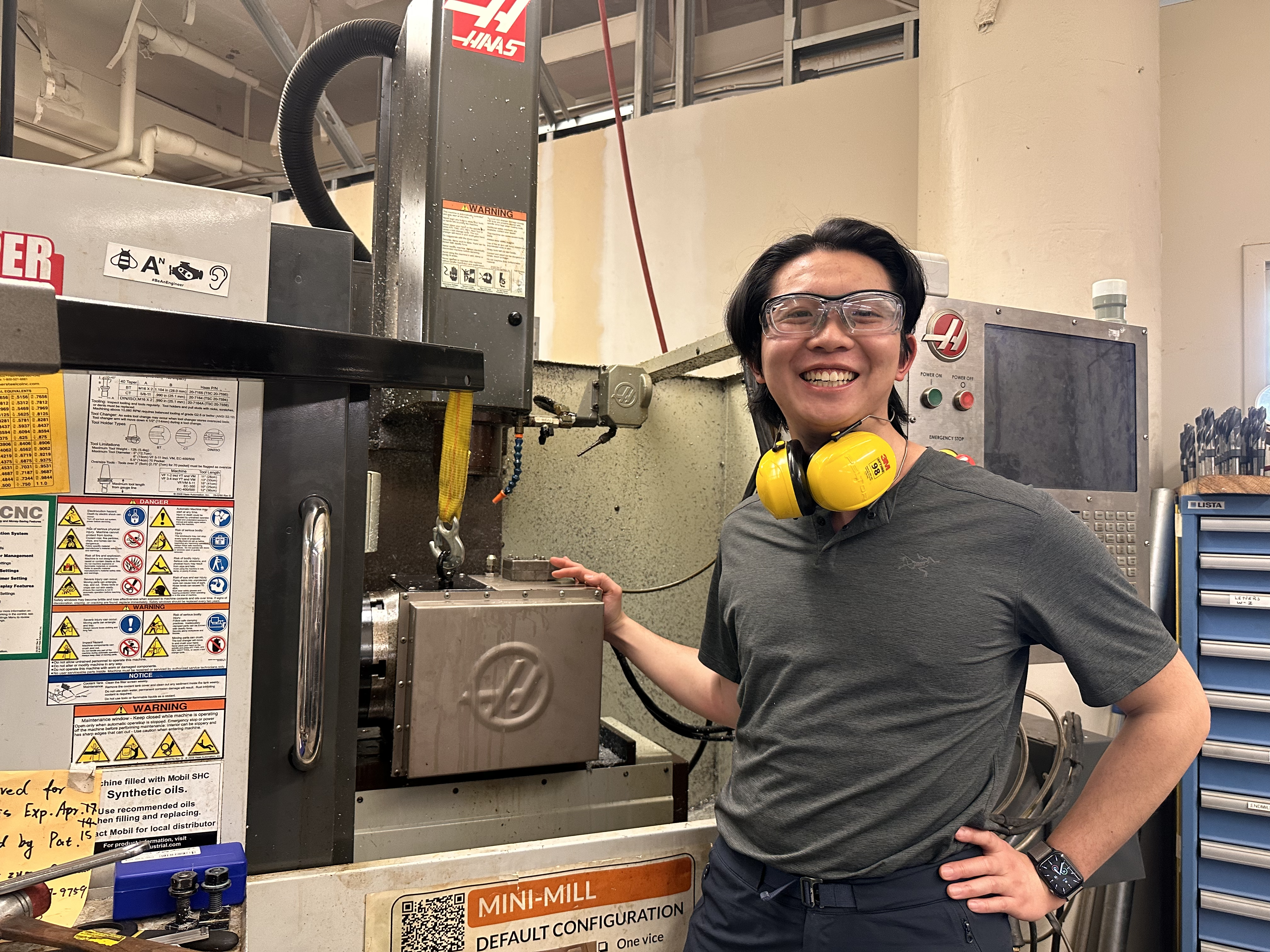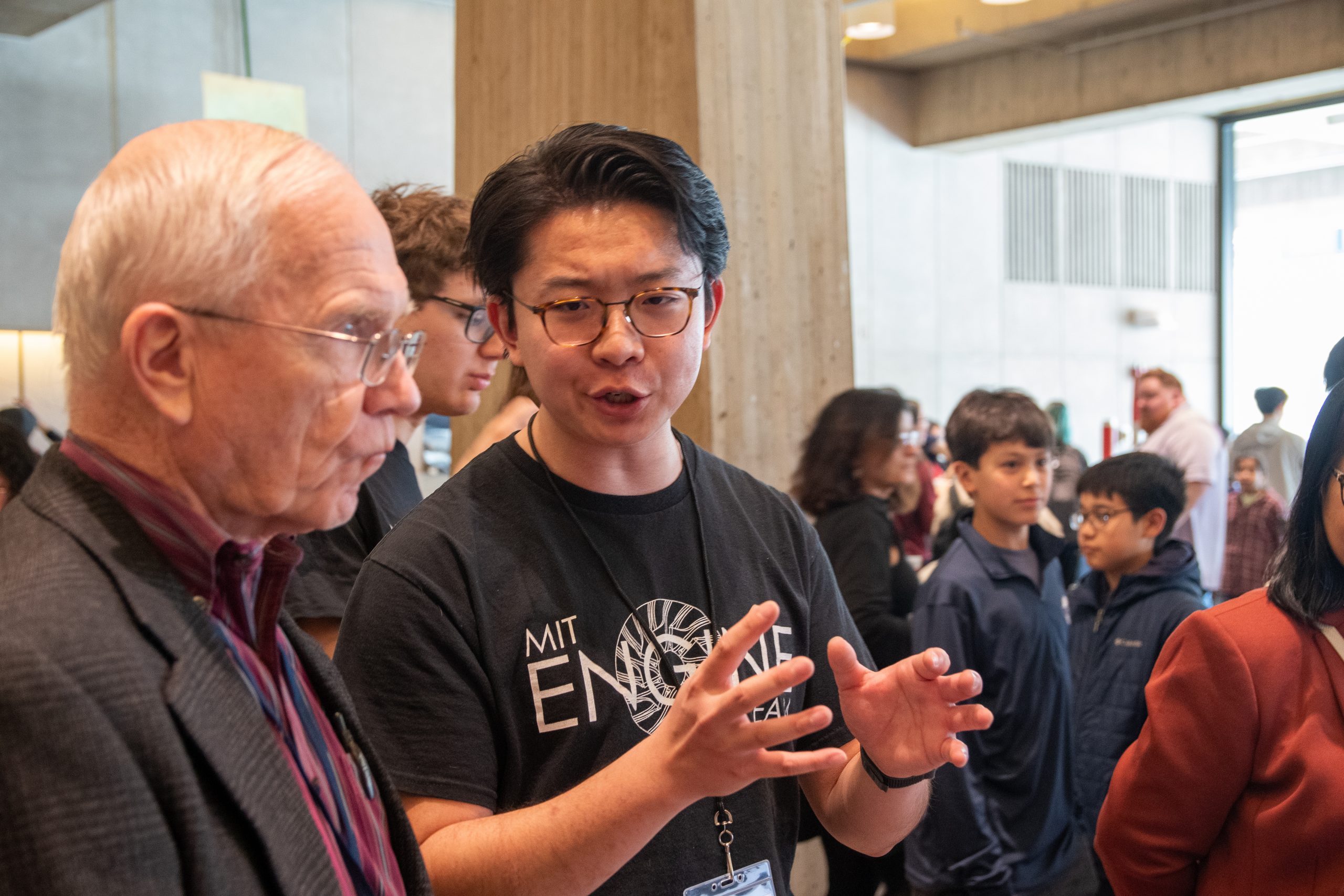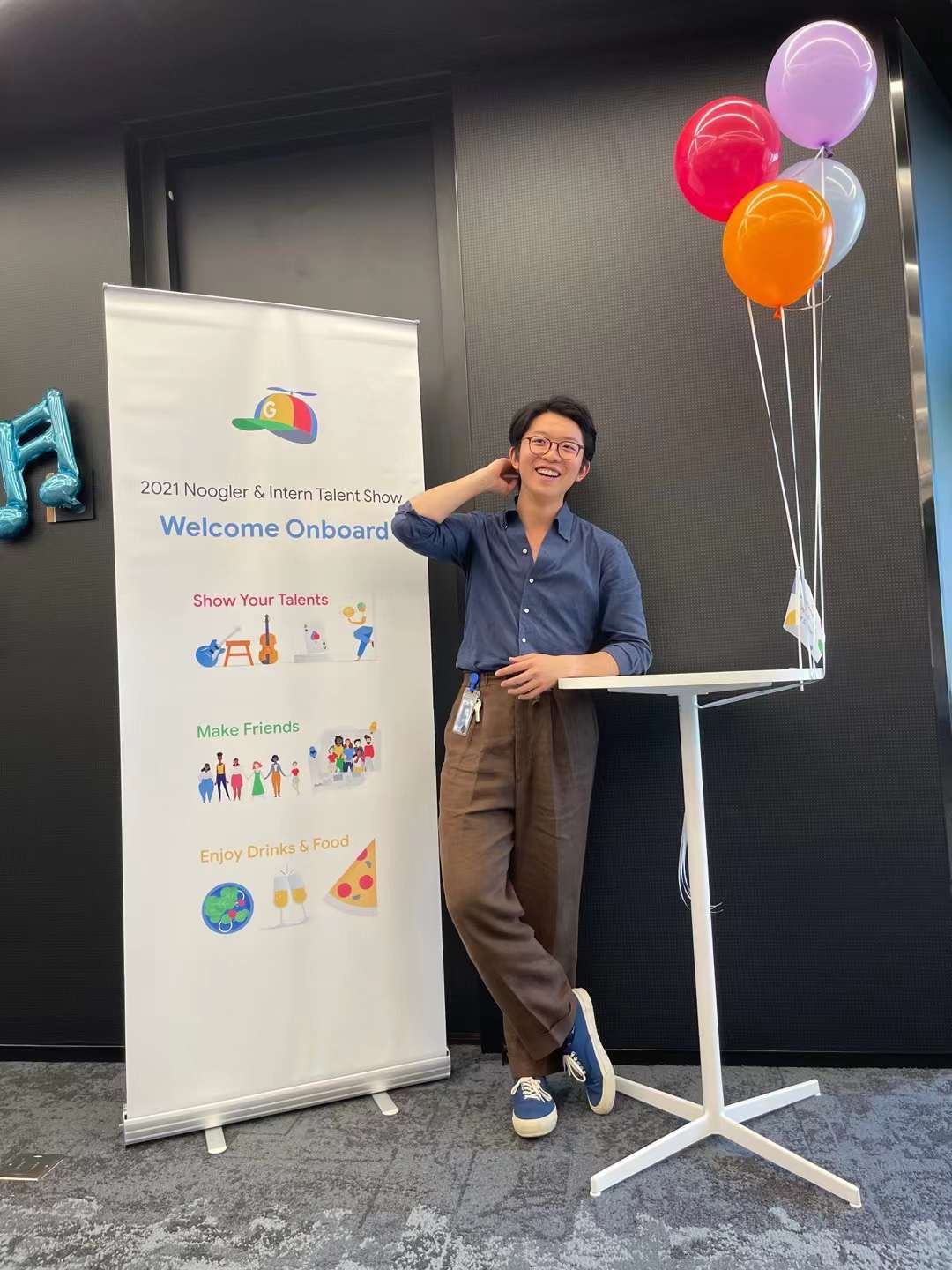Hello and welcome! I’m Charles Yong, a sophomore in Mechanical Engineering at MIT. My academic journey commenced at Peking University, where I spent three years studying Computer Science. Following that, I took a two-year gap to study at MIT as a Sloan Visiting Fellow. During this period, I uncovered my true passion for projects that interact with our physical world, which ultimately led me to pursue a Mechanical Engineering degree.
In this personal blog, I’ll share my experiences at the crossroads of machining, computational design, and mechanical engineering, along with my diverse interests, such as books, music, and beyond.
Should any of my posts capture your interest, please don’t hesitate to reach out to me at charles[at]mit.edu. Welcome to my blog!
By the way, “Control the controllable, observe the observable, leave the rest alone.” is quoted from Harry Shum.
Live long and prosper.
All posts are available chronologically at TIMELINE. And here’re some featured posts:
EC.S04 How to Build an Engine
During IAP 2023, I had the pleasure of conducting a two-unit workshop at MIT, where students learned advanced manual and CNC machining techniques to construct a fully operational internal combustion engine in just two weeks.
I would like to extend my heartfelt gratitude to Mark Belanger, Morningside Academy for Design, Project Manus, and the Edgerton Center for their invaluable support. Additionally, a special thanks goes out to Lee Zamir and Conor McArdle for their efforts in preparing the interview.
Aranya

It has been three months since the first time I tried to write about this spot on planet earth. It seems that Aranya carries too much meaning for me, that every time I tried to order my thoughts, I accomplished nothing but becoming effusive. Until recently.
Last week, I came across some lines from Claude Lévi-Strauss. It feels like Thanos snapped his fingers and my confusion vanished. I share a similar dilemma about Aranya as Claude feels about mountains: on the one hand, I value the solitude of it, and on the other hand, the solitude may cause the termination of Aranya.
For some years past, this preference has taken the form of a jealous passion. I hated who those shared my predilection, for they were a menace to the solitude I value so highly; and I despised those others for whom mountains meant merely physical exhaustion and a constricted horizon and who were, for that reason, unable to share in my emotions. The only thing that would have satisfied me would have been for the entire world to admit to the superiority of mountains and grant me the monopoly of their enjoyment.
Lévi-Strauss, C. (1992). Tristes tropiques (1955). Trans. John and Doreen Weightman. London: Penguin Books, 333.
In other words, it’s similar to the Arc Reactor for Tony Stark. It is the reactor that keeps Stark alive while the palladium within the reactor is poisoning him.

This is when I fell in love with Aranya. It’s very much like a scene in Oblivion: after a long period of time, humans became barely extinct. Just as Claude wrote in another chapter of the book I quoted above, the signs of the existence of human beings mark out, more clearly than if humans had not been there, the extreme limit that they have attempted to cross. Great nature placates the rebellion of humans and quells my turbulence.
I’m also a diehard fan of open water. Ripples on the surface make him alive. And he’s always here, listening. There’s a peaceful lake on my college campus. Without doubts, that’s the place for the inner me. Every time I approach the lake, the clamour in my mind fades away. It’s like a gigantic jar, purged and stored all my feelings——happy, sad, and everything in between. I always characterize the lake as a pensive old man. Not the style of The Old Man and the Sea, but more like Yoda.
In addition, Aranya is not only the certainty of space but also a state of mind. I’ve been super busy for the past year. And as far as I could tell, the coming one would not be of much leisure. Therefore, some time for simply wandering around is such a luxury for me. In the space opera Star Trek: The Next Generation, there’s some discussion about what makes humans different. Or, in other words, if a single feature of human is picked as the representative of mankind, which one would occupy the place of honour? The answer proposed by scriptwriters is curiosity. And I kind of agree with this one. Sir Ken Robinson once said: There are two types of people in this world: those who divide the world into two types and those who do not. Continuing this manner, I would like to divide the pursuit of curiosity into two kinds: those which require teamwork and those which do not. Throughout the last year, I’m offered some wonderful chances to collaborate with brilliant collaborators. A lost chance never returns. So, collaborations dominated my time. By and large, Aranya becomes the very only and dilapidated refuge for the private part of curiosity.
Every time I plan to spend some time at Aranya, I agonize. I’m so afraid that it may perish. Every visit I paid might be the valediction. I took the beginning picture of this article on my first visit to Aranya. And on my second trip here, it’s gone, encroached by a construction site. The following ones were taken during my first and second visits. Unfortunately, the spot disappeared before my third visit, with no trace. I hate what’s happening out there, but there’s nothing I can do except presenting my raw passion.
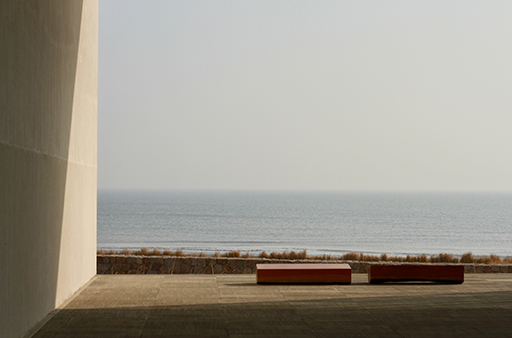
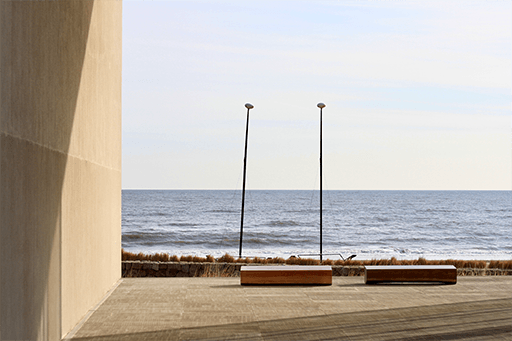
How this is gonna end? Maybe Aranya will still be there long after my death, while it’s entirely possible that it’s gone by tomorrow. I guess the only thing I could do and what I’m doing is that enjoy every moment with Aranya until the termination of either one of us.
Who knows where the road will lead us?
Sinatra, F. (1957). All the Way.
Only a fool would say
But if you’ll let me love you
It’s for sure I’m gonna love you
All the way
How Composers Manipulate Your Emotions
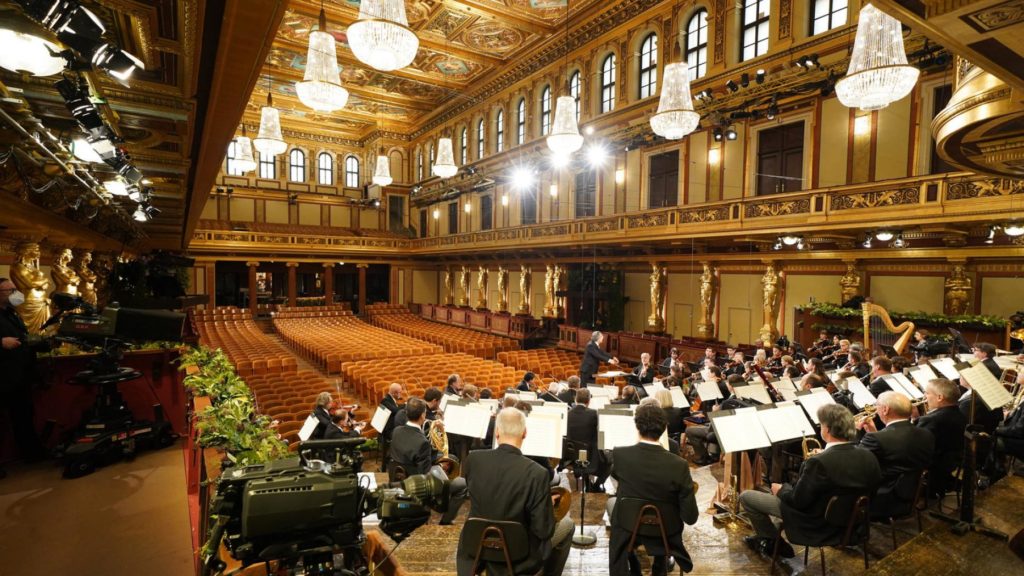
We’ve just enjoyed a special New Year’s Concert in a special year. For the very first time, Radetzky March at Neujahrskonzert is played without clapping.
Even without any audience, there’re some highlights though. Starting with recordings. With advanced technology and the absence of noise from the audience, this is probably the best recording of New Year’s Concert ever. And just before the intermission, VPO presents the first proper recording of two pieces from Zeller and Millocker ever.
As mentioned that the recording is fantastic, I was on heavy rotation of this album recently. The more I listen to it, the more I am engaged with certain pieces. It feels like you met this lovely girl and suddenly became irresponsibly mad for her. You could hardly tell which magic spell she cast on you, but she lives in your heart from the exact moment you met her. And then you just want to get to know her so much that you started to review every word she said to you to get through those long nights being apart from her.
Actually, I am that poor little guy being trapped by Neujahrskonzert. After a few sleepless nights, I’m here to share a tip of the magic spell.
Starting with the Fatinitza Marsch, it’s styled with groups of notes repeating the same key. For example, the 7th to 8th section. This arrangement creates a sense of solid power, which is very proper for a march.

But that’s not the point for now. What I wanna highlight is the arrangement between the intro and the theme, which is located in the 5th to 6th section. Just the first 10 seconds would be enough.
After the juicy intro played by the string sector and the wind sector, and before the rich theme by the entire orchestra, there’re two sections of a rather quiet background by the string sector only. This is such a great design! After the grand opening, those two sections are saying that “Don’t go! There’s something better later on.” While they also inspire your curiosity about what happening next. These sections are composed of neat instruments and simple key arrangements. The strings are giving you hints. So here’s the first trick. But it’s a very junior one, even young Weasley could do. Things are getting better.
And the second trick I would like to mention is how to push one to move forward. This example astonishingly exhibited how composers bewitch you.
This is a part of the coda from Bad’ner Mad’ln, Walzer, Op. 257. From section A to C, with the help of the snare drum, the mix got richer and richer. In section A, it’s like somebody is whispering that something is coming. And in section C, it’s like somebody is shooting that something is coming and is coming hard! After that, everything is gone, but a complete rest. This is the last peace before the war!
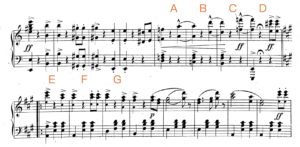
Then here’s a two-fold design of the idea. Firstly, The last two notes in section D, which are also the leading notes of the idea, are absent from the bass drum and crash cymbals. They didn’t join until the third note of the idea. Secondly is that the rhythm is specially designed: in section E, the last note is a quarter. But in section F, it’s replaced with two eight notes. And in Section G, it’s back to a quarter. This kind of change of rhythm kills your prediction and drives you into total madness.
As we’re talking about the use of rhythm, let’s do a wrap jump into the other extremely: manipulates you with basically no rhythm. Here I would like to highlight an iconic work by Samuel Barber.

The first time I met with this work, I thought it was composed by John Williams for some sci-fi films. It does share some sense of Interstellar though. With a tremendous use of the string sector, this piece is composed of extreme continuity. Anyway, words are pale, especially for works with great passion. Here’s Gustavo Dudamel with VPO presenting Adagio for Strings, you have to feel it yourself:
As I am writing this article tonight, I listened to it about 10 times. And this work indeed is sucking every drop of emotion out of me. Here’s a screenshot from the video above. Dudamel is always passionate, but at this moment, he’s caged. You can tell that every inch of his muscles is contracting. But this power has no place to go: they’re caught in the tender trap of strings.

How this is happening? How did Samuel Barber magically start the chain reaction of my emotions and generally squeeze them until they have nowhere to go?
As far as I could tell, three steps are planned. Samuel firstly defines the space with the contrast of violin and contrabass. He then lets the melody run through instruments to create mass in this empty space. Lastly, he generally pushes different sectors together to a single melody and lets the violin scream for you.
Firstly this work starts with the theme played by the first violin, defining the upper bound of this space. Then generally the theme moved to viola. After that, violoncello took over the theme and defined the lower bound of this space.
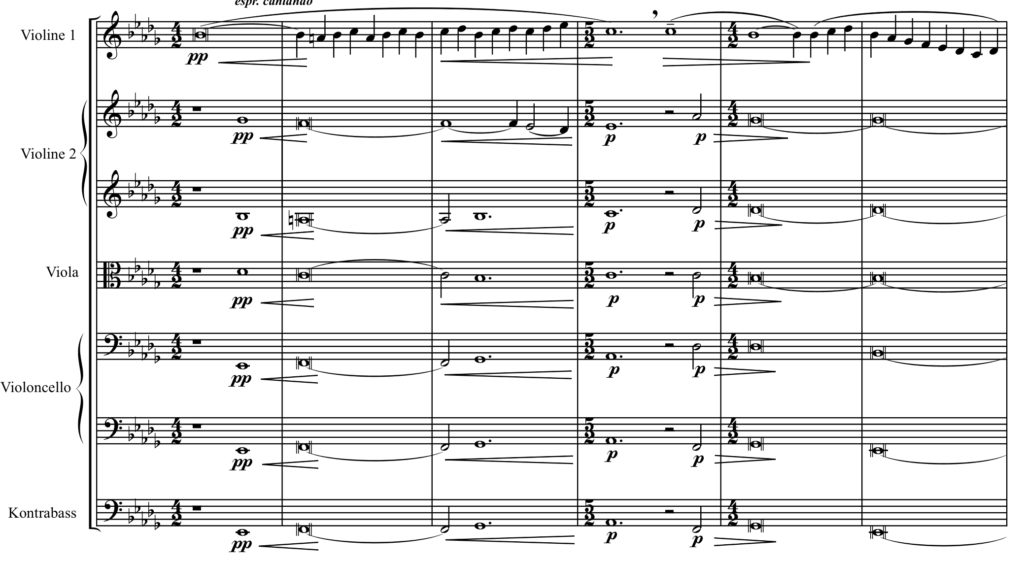
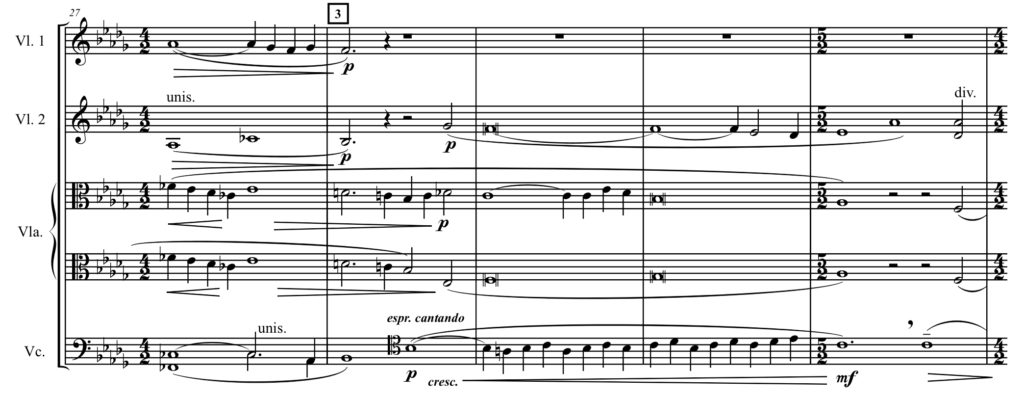
Then here’s another fold. From section 36 to section 41, the melody runs from violoncello to violin. Especially in section 38, you could almost picture violoncello handing over the baton to the second violin, and then the first violin. It seems that molecules in this space are trying so hard to escape with Brownian motion, while they’re strictly bounded by Samuel.
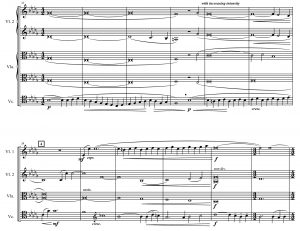
After the expansion, the contraction followed. From section 48 to 53, sectors are gradually pushed together. In section 48, the resistance is still fighting. In section 49, the entire university is counting on the Millennium Falcon. And finally, in section 50, the Empire won. The dark side of the Force dominates the entire section with one note!
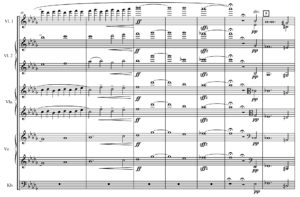
With a complete rest, the universe is gone. Nothing is left. The very only sound you could hear is your heart beating hard. Thankfully, there’s an ending. Or it’s really hard to come back to reality.
That’s the very end of this article. Inspired by Neujahrskonzert 2021, I present three tricks composers used to manipulate emotions of the audience. Sometimes I felt that it’s so unfair that my feeling is manipulated by composers like a puppet, while for the rest time feeling so lucky to glance at the beauty of the classics. Wish you a later happy new year and a good night.
Notes on “The Grand Titration: Science and Society in East and West”
What had happened to explain why this lead never led to“modern” science in China? The great margin between theories and practice killed science. More detailed, Absolute Monarchy killed science in practice while Confucianism kept science away Ideologically.
Absolute Monarchy
In many ways, theories in ancient China are prosperous (not necessarily advanced). And technologies in ancient China are advanced (yes, advanced and much more advance than the western world). However, Absolute Monarchy stopped theories to apply to practice and therefore killed science.
Hierarchy of Absolute Monarchy is extremely harmful. On the one hand, it stopped applying theories to practice. In tradition, researchers who work in theories rank much higher than artisan (engineers). Hierarchy stopped researchers work with artisans. There’s another view: Capitalism is the mother of modern science. And the reason for this is that trading needs math, sailing needs physics. In addition, though trading and sailing exist in any kind of society, Capitalism needs those two much more than other kinds. Capitalism needs trading and sailing desperately. Theories are meaningful to capitalism after they are applied to practice. In short, Capitalism encourages to apply theories to practice while Absolute Monarchy stops this procedure from happening.
On the other hand, Hierarchy requires ancient researchers who haven’t ranked high enough (which are most of them) to convince their boss in a short period of time. Usually, the emperor will not spend any time arguing with you. So they tend to use the analogy to express ideas. Which is basically opposite to the deduction which is crucial to modern science. Meanwhile, Absolute Monarchy means to comply while democracy means doubts. So here it comes to the mind level.
Confucianism
Confucianism cares about social problems and only. In other words, if Taoism takes control of China instead of Confucianism, science might appear in China much earlier than the time of Galileo.
Confucianism killed science indirectly by controls public in mind which prevent Capitalism take place in China, even though iron processing technology is much more advanced in ancient China.
Confucianism suggests to governing without interface. Do without doing. This kind of thoughts conflict with the practical spirits of experiments which is crucial to modern science. There’s a great example of this: I Ching. This book explains this world in a schematic way. If you apply the system built by this book, you no longer need to observe this world nor practice. That’s how science is killed.
Conclusion
Science is unplannable. You need to provide a proper environment. After that, all you can do is to pray for seeds to germinate. So in a word, the answer to the Needham Problem is that ancient China is not the right environment for science to germinate.
Oh! Howie!
It’s just so gland to witness, if I may, friends growing up.
You see, before Howard met Bernadette, he was such a nerd. For sure he has a colourful inner world all the time. But somehow he was disconnected with others. Till I saw this one, he had mastered the art of love.
So is Mike Ross, Louis Litt and maybe Harvey Specter. It’s my honour to meet you guys.

THE LAST LECTURE: Randy Pausch’s Advice on How To Be A Child
Really Achieving Your Childhood Dreams
Childhood dreams Randy had achieved: being zero gravity, playing in NFL, authoring an article in the World Book encyclopedia, being Captain Kirk, winning stuffed animals, and being a Disney Imagineer.
So what’s the key to doing this? In my point of view, the answer is to value your dreams. In common sense, the following sentences stand: During your childhood ages, you are just so naive to find out where you are destined for. However, after your naivety fades away, there is no much choice anymore. After reading this book, I suddenly realized that it is not that there is no much choice left but it’s your naivety had gone. Naivety may go against acting rationally but that’s the key to appreciate your life.
As for Randy, a computer scientist. winning stuffed animals is not the dream he is supposed to have. But it is those stuffed animals which make him enjoy extra joy besides conducting research in the field of computer science. Moreover, for a professor, working as a Disney Imagineer is useful at all. I guess in most cases, people will give up this dream with never mind.
What makes your life meaningful is not how much money you make but your childhood dreams. Besides, even if you save your time by ignoring your childhood dreams, those time will not make you rich.
Go For Your Jai
There’s a picture of Randy and Jai. It reminds me of the happiness of love. Jai is in her brightly white wedding dress and Randy is in a damn handsome suit. If you’ve been in love, I can tell you that that smile on Jai’s face is unique, only for lovers.
Randy was famous for the reputation of a playboy. Why did he stop and marry Jai? That’s a question I am still questioning myself. I went to some places recently. And the memory came back. Once, I thought that relationship will last forever. But I ended it. The relationship is such a tricky thing.
Luckily, there is something which is certain. Firstly, dating is very much different from marriage. As for dating, all you need to do is to have fun. But for marriage, it is a kind of insurance. Secondly, never lose yourself in a relationship. No matter you are going to have fun or getting insurance if you are a jerk than you will never make it. Thirdly, don’t be greedy.
Earnest Is Better Than Hip
This is not the most vital section in this book. Actually, this section takes only two pages. But I’ve been thinking of this question for a long period of time.
Randy said: Earnestness is highly underestimated. It comes from the core, while the hip is trying to impress you with the surface. I’ve been searching for what I am earnest in. And there’s one thing for sure: we all should try to be earnest on something.
A Rocket And Stars
There is a picture of a rocket and starts on the very first page of this book. The time when I saw this picture, I knew that this is the man who I want to become.
I was recommended to read this book by a professor giving lectures at my university. And now I am recommending this book to you too. To tell the truth, this book will probably not change you too much. But it’s definitely more interesting than ten hours’ time spent on reading through Moments on Wechat.
Please allow me to end this note with a sentence from Randy: My uniqueness, I realized, came in the specifics of all the dreams.
